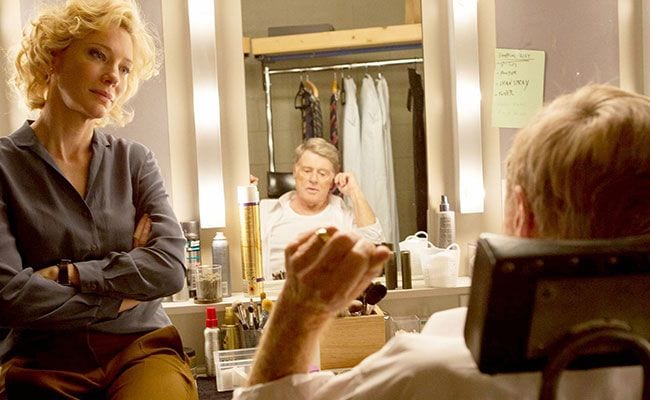
“You were away for a long time,” observes Robby Mapes (Connor Burke). He holds a microphone toward his mother, Mary Mapes (Cate Blanchett), interviewing her about her job, network news producer. “Were you with the men with the cameras?” Yes, she nods.
And now she’s in front. As the emotional focus of the movie Truth, Mapes embodies all that’s difficult and heroic about her job, the long hours, the psychic demands, the moral dilemmas. She also makes clear the mechanics of putting together a show. “We’re trying to get to the truth here,” says her reporter Dan Rather (Robert Redford), framing his on-screen appearance as a mission as much as a profession. Mapes makes that performance possible. As much as Dan Rather might believe what he says, he can only say it because he has people behind him, “the men with the cameras”, plus, in this case, a woman.
This makes Mapes a groundbreaking figure certainly, admirable and noble and courageous, with a resume that includes CBS’ Peabody Award-winning Abu Ghraib story. But according to Truth‘s troubling configuration, it also makes her the central figure in an awfully conventional melodrama.
This particular melodrama has all kinds of historical ramifications, built as it is around the 2004 story that led to Mapes and Rather leaving CBS, the story on George W. Bush’s Texas Air National Guard service. It appears the president-to-be went AWOL, but Mapes’ team is unable to confirm this — after the story airs — which leads the story to be known not as a George Bush story, but as the Dan Rather Scandal.
The film argues that the story, based on memos not quite verified as written in 1972 and 1973, not only determines Bush’s re-election in 2004, but also marks a shift in what “the news” does. That shift, as Rather describes it here, standing on a hotel balcony with a drink in his hand, has to do with news shows making money, being corporate, and entertaining consumers rather than serving a public good. If “Rathergate” isn’t the cause of this long-in-the-making shift, it’s an apposite illustration.
The men who work with Mapes, with cameras and without, voice this concern repeatedly. In this rendition, once Rather does the story, he remains mainly above the fray, speaking with Mapes on the phone, en route to another story while the team struggles to verify the memos and their sources (including a righteously outraged veteran played by the great Stacey Keach). Alternately, the team is convinced the story is right, and dig in not only to find proof in records, but also to condemn the odiously cozy relationship between news organizations and the government.
The movie’s most vocal truth-seekers, apart from Mapes, are Vietnam war veteran Lt. Colonel Roger Charles (Dennis Quaid) and researcher Mike Smith (Topher Grace), who goes so far as to make a speech in the CBS office, warning that they’re all at the mercy of commercial and political interests, that they’re all at risk of being fired so that CBS might stay in business. It’s hardly a shock that Mike is right. But just when he underscores this infernal mixology, the film heads in another direction, focusing on Mapes’ domestic saga.
Based in part on Mapes’ memoir, Truth and Duty: The Press, the President, and the Privilege of Power, Truth goes on to explore her “truth”, which is to say her pop-psychological personal history, which includes an abusive father and a father-daughter dynamic with Rather (this is emphasized during an explanation by one colleague to another, as the two men gaze on Rather and Mapes sleeping side by side in their airplane seats, in lovely composition and lighting).
If Rather is her excellent good dad, the (off-screen) bad dad story drives Mapes, as the corporate and government suits coming after her become him. She worries about getting “smacked” and blurts out to her endlessly understanding husband Mark (John Benjamin Hickey), that “No matter what I say, no matter what I do, I’m gonna get hit.” He tries to soothe her, noting, “This is not that,” but it is, pretty much exactly that, you know.
As Mapes’ punishment by CBS becomes something like a legal process, she’s advised that “This isn’t a trial, it’s a hunt.” She hires a lawyer, she thinks about preserving her career, and she thinks again and again about what it means to pursue and also to tell the truth.
Truth is fiction. No matter the provenance of the memos, the trustworthiness of the sources, or the varying motives of any number of players, the film offers versions of truths by telling stories. These have upset some participants (CBS made public its refusal to run ads for the film) and backed up others, as so many truths tend to do. If only it didn’t obfuscate these complexities by framing Mapes’ story so narrowly.


![Call for Papers: All Things Reconsidered [MUSIC] May-August 2024](https://www.popmatters.com/wp-content/uploads/2024/04/all-things-reconsidered-call-music-may-2024-720x380.jpg)



